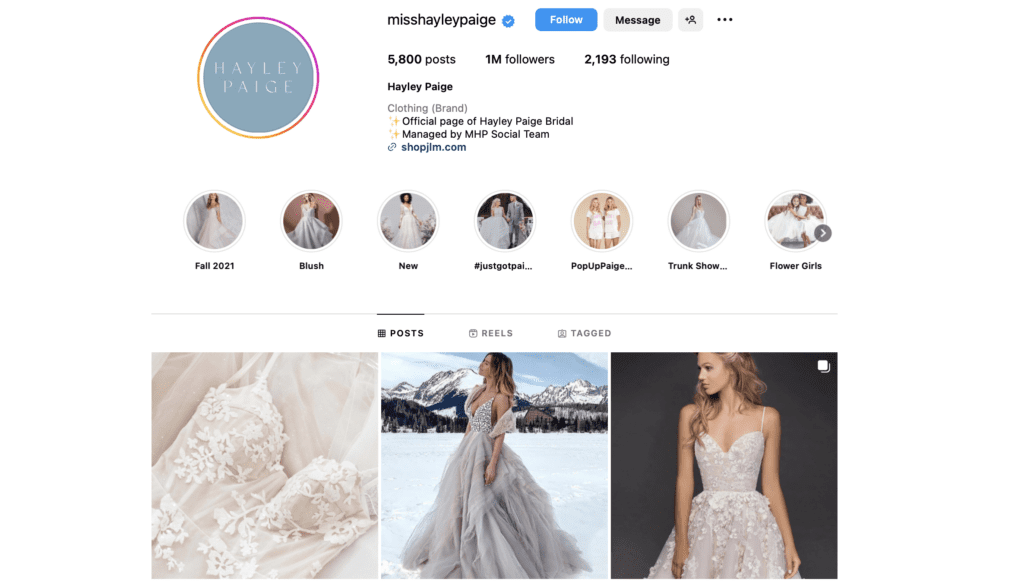A federal appeals court has sounded off (yet again) in a “first-of-its-kind case,” setting out the framework for determining ownership of social media accounts. In an opinion on Wednesday, a panel of judges for the U.S. Court of Appeals for the Second Circuit vacated a preliminary injunction that previously barred designer and influencer Hayley Paige Gutman from using social media accounts bearing her name and that awarded control of those accounts to her former employer, wedding dress company owner JLM Couture, holding that ownership of the accounts should be determined “like any other form of property,” namely, by first determining who owned the account at the moment of its creation and then evaluating whether that owner sold or transferred the account.
For some background: JLM Couture filed suit against Gutman back in December 2020, accusing the designer – who previously helmed the JLM-owned Hayley Paige brand – of trademark infringement and dilution, unfair competition, breach of contract, conversion, and breach of fiduciary duty, among other claims, and claiming exclusive rights in the “Hayley Paige” name and variations, thereof, in accordance with the terms of the employment agreement the parties first entered into in 2011. In 2019, after Gutman and JLM unsuccessfully attempted to negotiate amendments to Gutman’s contract, the designer changed the passwords to the disputed accounts she has created – namely, the @misshayleypaige Instagram, Pinterest, and Twitter accounts – and refused to give JLM access. Thereafter, JLM filed suit, arguing, among other things, that Gutman created the accounts in her capacity as an employee, making it is the rightful owner.

Gutman, on the other hand, argued that she “created the accounts in her personal capacity, that JLM did not acquire them simply by virtue of investing in the Hayley Paige brand, and that she did not cede ownership to JLM by agreeing to use her accounts to market Hayley Paige products or by occasionally giving other JLM employees direct access [to the accounts] when it was in her interest to do so.”
In March 2021, the district court awarded JLM a preliminary injunction, barring Gutman from competing with JLM through the end of her contractual term and from using her name and its derivatives in trade or commerce, including via the disputed @misshayleypaige social media accounts for the duration of the litigation. (Following an appeal to the Second Circuit, the district court modified the injunction to give JLM exclusive control over the social media accounts, prompting another appeal from Gutman.) The district court also held Gutman in civil contempt for a series of Instagram posts that she created using a new account that it found to be “marketing” in violation of an earlier version of the preliminary injunction.
The Second Circuit’s Opinion
In its January 17 decision, the Second Circuit panel: dismissed Gutman’s appeal from the district court’s interlocutory contempt order for lack of appellate jurisdiction; affirmed the lower court’s refusal to dissolve its preliminary injunction; and vacated in part the district court’s order modifying its preliminary injunction because it erred in determining ownership of the disputed accounts and failed to assess the reasonableness of the five-year non-compete restraint on Gutman.
On the issue of ownership of the social media accounts, the Second Circuit agreed with Gutman and found that the district court erred by modifying its preliminary injunction to give JLM exclusive control over the disputed accounts. In particular, the panel took issue with the six-factor test that the lower court used to determine ownership of the social media accounts. Those factors included: “(1) whether the account handle reflects the business or entity name; (2) how the account describes itself; (3) whether the account was promoted on the entity’s advertisements or publicity materials; (4) whether the account includes links to other internet platforms of the entity; (5) the purpose for which the account was used, including whether it was tied to promotional or mission-oriented activities of the entity; and (6) whether employees or members of the entity had access to the account and participated in its management.”
The district court “expressly declined to consider whether Gutman owned the disputed accounts when they were created,” according to the Second Circuit, which held that while determining the ownership of social-media accounts “is indeed a relatively novel exercise, that novelty does not warrant a new six-factor test.” The disputed accounts “should be treated in the first instance like any other form of property, [which] includes determining the original owner.”
Against the background, the panel of judges asserted that “when Gutman created the disputed accounts, any associated property rights belonged to someone. And if she created them using her personal information and for her personal use, then those rights belonged to her, no matter how the accounts may have been used later.” The judges determined that Gutman’s use of the “@misshayleypaige” username “does not support a presumption that she created the account for business purposes,” in part because she “licensed her name and its derivatives to JLM for use only in trade or commerce, [and] she was entitled to continue using her name for noncommercial purposes, including personal social-media accounts.”
The Second Circuit further held that “the fact that Gutman transferred some or all of her rights in particular content posted on the disputed accounts [to JLM] does not by itself support an inference that she transferred ownership of the accounts themselves.” Nor should it matter to the question of ownership “whether an account owner permits others to assist in managing the account, or whether one or the other party holds itself out as owning it.”
Still yet, the appeals court stated that the district court erred by concluding that JLM is likely to succeed in demonstrating ownership of the disputed accounts under the terms of its contract with Gutman, specifically the provision that states that “all ‘designs, drawings, notes, patterns, sketches, prototypes, samples, improvements to existing works, and any other works conceived of or developed by [Gutman] in connection with her employment with [JLM] involving bridal clothing, bridal accessories and related bridal or wedding items,’ are works for hire and the exclusive property of JLM.”
While the district court ruled that the accounts qualify as “any other works” conceived of or developed by Gutman in connection with her employment and thus, were likely assigned to JLM, the Second Circuit disagreed, finding that the social media accounts “share none of these core attributes” as the enumerated works, such as sketches and drawings of wedding dresses. “It would thus be inconsistent with ordinary principles of contract interpretation to conclude that [that provision] of the contract assigned the accounts to JLM,” the appeals court held.
The Bottom Line: “The analysis of social-media-account ownership begins where other property-ownership analyses usually begin – by determining the account’s original owner,” according to the Second Circuit. “The next step is to determine whether ownership ever transferred to another party. If a claimant is not the original owner and cannot locate their claim in a chain of valid transfers, they do not own the account.”
With the foregoing in mind, the Second Circuit remanded the case back to the district court for further proceedings.
Reflecting on the Second Circuit’s opinion, Haynes Boone’s Joe Lawlor, one of the attorneys representing Gutman, said, “Influencers and brands have been working under a cloud of uncertainty, because prior to today, no federal circuit court had provided a framework for determining competing claims to social media account ownership.” He stated that this is a particularly “vital decision and victory for the future of similar cases, which are certain to be prevalent in an age of increasing use of influencer and digital marketing.”
In terms of the Second Circuit’s decision to vacate the five-year non-compete entered against Gutman by the district court, Lawlor asserted that “this is a win not just for Ms. Gutman, but for others that are subject to these improper restrictions. We’re hopeful that Ms. Gutman will soon be able to return to doing what she loves – designing wedding dresses and connecting with her followers on social media.” He noted that New York law requires non-competes to be “reasonable in duration” and “necessary to protect the employer’s legitimate interests.”
The case is JLM Couture, Inc. v. Gutman, 1:20-cv-10575 (SDNY).











